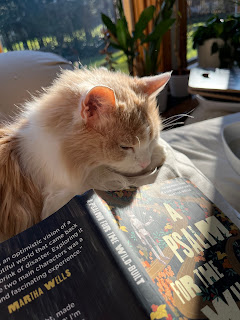My definition of "a best book" would be the books that get under my skin. The books I can't forget even years later, the books that have pushed me outside my comfort zone, the books that have shaped me in fundamental ways. Forthwith my list of nine (like the NYT list, a perfect square) best books, more or less in the order I encountered them. What's on your list?
Madame Curie, Marie Curie's biography written by her daughter, Eve Curie. I continue to be perplexed that there isn’t a Disney version of Manya Skłodowska Curie’s life. Between the death of her mother, the sleigh rides with Kazimierz Żorawski, her wonder at the university in Paris, fainting in a garret, the glowing radium in the lab...her life seems Disney-princess ready. I read this book during the summer I as when I had been very ill, unable to get out of bed without help. It is more hagiography than cold biography, and perhaps that's why I hear whispers of it from time to time as I reflect on my own life work. I could not get her grief at the sudden death of Pierre out of my mind the first time I read it, and given my own experiences, have thought about it many times since.
The Sherlock Holmes stories by Sir Arthur Conan Doyle. This was another book that I read the summer I was so ill, the treat of several new hardcover books from my mother is one I still appreciate. I was taken with Sherlock Holmes scientific approach, the use of data to draw conclusions, and the attentiveness to the small clues that others might overlook. It might not be too much of a reach to say that my interest in molecules that misbehave in my attentiveness to the small clues they offer in their structures derives from reading these stories that long-ago summer.
Have Spacesuit Will Travel By Robert Heinlein. This may be the first science fiction book I read. I rode my bike to the little library which was housed with the rest of the town's services in a residential house on a humid summer day. I can close my eyes and see the cover, a bright yellow and black. While these days I find the politics that infuse Heinlein's writing a bit off putting (ok, perhaps more than a bit off putting) this book really captured my imagination, in part because of the strong women characters in it. And in the year that we landed on the moon for the first time, it was a particularly exciting read!
In This House of Brede by Rumer Godden, I read this tale of a monastery of contemplative nuns when I was in high school. Since then I have read it any number of times, the nuns are exquisitely human, struggling with cold feet and academic jealousy and the budget. The main character, Dame Philippa, is a late vocation, a widow with a tragic past. After having been department chair, I also sympathize with the abbess, Dame Catherine.The book jumps in time and perspective, the nonlinearity gives it a depth that makes it worth revisiting.
Anna Karenina by Leo Tolstoy. I read this when I was 11, after an excerpt in a book I'd been given for Christmas piqued my interest. From it I learned the joys of long and richly textured novels. A couple of years later I watched a cinematic version of war and peace and then wanted to read the book, which led to a long argument between my mother and the librarian who did not want to let me check it out. Not because she thought the themes were too adult, but she did not think I was capable of finishing the book in the allotted two weeks. When she finally reluctantly checked it out, she gave me lots of advice about how to read it, including making lists of characters. Advice which I promptly ignored and simply dug in.
The Sayings of the Desert Fathers: The Alphabetical Collection Benedicta Ward OSB's translation of the Apophthegmata Patrum, the sayings of the desert fathers, is something I return to again and again, the pithy advice of these early Christian hermits, both mothers and fathers, is often just what I need.
Ink, by Sabrina Vourvoulias. This book is rooted in places and people and rituals I recognize. There is a chemist and people who risk much for justice. And the world is more than what we see. It’s is also terrifyingly prescient, written before Trump, but plays out what could be, what now has been. I read the news and after reading Ink found I could no longer tell myself, “I had no idea. I can’t imagine such a world.”
Book of Hours, Rainer Marie Rilke. I am particularly fond of the translation by Anita Barrows, which places her luminous translation against the original German of Rilke. I really don't have the words to say the way some of these poems reach to the heart of my experience of prayer, except perhaps to quote the poet through Barrows:
In deep nights I dig for you like treasure.
For all I have seen
that clutters the surface of my world
is a poor and paltry substitute
for the beauty of you
that has not happened yet...
My hands are bloodied from digging.
I lift them, hold them open in the wind,
so they can branch like a tree. — II,34
Liturgy of the Hours. Never far from my hand, the round of psalms enfolds me, shapes me, comforts me, challenges me. The imagery — buzzing bees, slimy snails, broken pottery, heart tearing grief, raucous parties — drags me in.
Photo is of Fluffy and my current read, A Psalm for the Wild Built by Becky Chambers. Monks, tea, robots, electric bikes, hermitages and pilgrimages. What makes a soul? It's a terrific read.

No comments:
Post a Comment